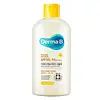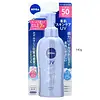What's inside
What's inside
 Key Ingredients
Key Ingredients

 Benefits
Benefits

 Concerns
Concerns

 Ingredients Side-by-side
Ingredients Side-by-side

Water
Skin ConditioningHomosalate
Skin ConditioningEthylhexyl Salicylate
UV AbsorberButyl Methoxydibenzoylmethane
UV AbsorberPhenylbenzimidazole Sulfonic Acid
UV AbsorberC12-15 Alkyl Benzoate
AntimicrobialDipropylene Glycol
HumectantCetearyl Alcohol
EmollientGlyceryl Stearate
EmollientOctocrylene
UV AbsorberCetearyl Olivate
Myristoyl/Palmitoyl Oxostearamide/Arachamide Mea
Skin ConditioningOpuntia Coccinellifera Fruit Extract
Skin ConditioningCucumis Sativus Fruit Extract
EmollientAloe Barbadensis Leaf Juice
Skin ConditioningNymphaea Alba Flower Extract
Skin ConditioningMadecassoside
AntioxidantAnthemis Nobilis Flower Extract
MaskingPolysorbate 60
EmulsifyingSorbitan Olivate
EmulsifyingPolyacrylate-13
Dimethicone
EmollientSodium Hydroxide
BufferingPEG-100 Stearate
Sorbitan Stearate
EmulsifyingPolyisobutene
Tocopheryl Acetate
AntioxidantPolysorbate 20
EmulsifyingSorbitan Isostearate
EmulsifyingPropylene Glycol
HumectantButylene Glycol
HumectantDisodium EDTA
Caprylyl Glycol
EmollientEthylhexylglycerin
Skin Conditioning1,2-Hexanediol
Skin ConditioningParfum
MaskingWater, Homosalate, Ethylhexyl Salicylate, Butyl Methoxydibenzoylmethane, Phenylbenzimidazole Sulfonic Acid, C12-15 Alkyl Benzoate, Dipropylene Glycol, Cetearyl Alcohol, Glyceryl Stearate, Octocrylene, Cetearyl Olivate, Myristoyl/Palmitoyl Oxostearamide/Arachamide Mea, Opuntia Coccinellifera Fruit Extract, Cucumis Sativus Fruit Extract, Aloe Barbadensis Leaf Juice, Nymphaea Alba Flower Extract, Madecassoside, Anthemis Nobilis Flower Extract, Polysorbate 60, Sorbitan Olivate, Polyacrylate-13, Dimethicone, Sodium Hydroxide, PEG-100 Stearate, Sorbitan Stearate, Polyisobutene, Tocopheryl Acetate, Polysorbate 20, Sorbitan Isostearate, Propylene Glycol, Butylene Glycol, Disodium EDTA, Caprylyl Glycol, Ethylhexylglycerin, 1,2-Hexanediol, Parfum
Water
Skin ConditioningEthylhexyl Methoxycinnamate
UV AbsorberAlcohol Denat.
AntimicrobialPropylene Glycol
HumectantDimethicone
EmollientEthylhexyl Triazone
UV AbsorberDiethylamino Hydroxybenzoyl Hexyl Benzoate
UV FilterButylene Glycol
HumectantLysine Lauroyl Glutamate
CleansingPyrus Cydonia Seed Extract
MaskingGeranium Robertianum Extract
AstringentPhellodendron Amurense Bark Extract
Skin ConditioningSodium Hyaluronate
HumectantAcrylates/C10-30 Alkyl Acrylate Crosspolymer
Emulsion StabilisingCarbomer
Emulsion StabilisingTocopheryl Acetate
AntioxidantSodium Hydroxide
BufferingBHT
AntioxidantMethylparaben
PreservativeWater, Ethylhexyl Methoxycinnamate, Alcohol Denat., Propylene Glycol, Dimethicone, Ethylhexyl Triazone, Diethylamino Hydroxybenzoyl Hexyl Benzoate, Butylene Glycol, Lysine Lauroyl Glutamate, Pyrus Cydonia Seed Extract, Geranium Robertianum Extract, Phellodendron Amurense Bark Extract, Sodium Hyaluronate, Acrylates/C10-30 Alkyl Acrylate Crosspolymer, Carbomer, Tocopheryl Acetate, Sodium Hydroxide, BHT, Methylparaben
 Reviews
Reviews

Ingredients Explained
These ingredients are found in both products.
Ingredients higher up in an ingredient list are typically present in a larger amount.
Butylene Glycol (or BG) is used within cosmetic products for a few different reasons:
Overall, Butylene Glycol is a safe and well-rounded ingredient that works well with other ingredients.
Though this ingredient works well with most skin types, some people with sensitive skin may experience a reaction such as allergic rashes, closed comedones, or itchiness.
Learn more about Butylene GlycolDimethicone is a type of synthetic silicone created from natural materials such as quartz.
What it does:
Dimethicone comes in different viscosities:
Depending on the viscosity, dimethicone has different properties.
Ingredients lists don't always show which type is used, so we recommend reaching out to the brand if you have questions about the viscosity.
This ingredient is unlikely to cause irritation because it does not get absorbed into skin. However, people with silicone allergies should be careful about using this ingredient.
Note: Dimethicone may contribute to pilling. This is because it is not oil or water soluble, so pilling may occur when layered with products. When mixed with heavy oils in a formula, the outcome is also quite greasy.
Learn more about DimethiconePropylene Glycol is an odorless, colorless liquid. As a humectant, it helps skin retain moisture. It also aids in delivering active ingredients.
Another role of this ingredient is preventing a product from melting or freezing. Propylene glycol also adds antimicrobrial properties to a product, elongating product lifespan.
This ingredient is considered an organic alcohol and commonly added into both cosmetics and foods.
Those with sensitive skin or conditions may develop a rash when using this ingredient.
Learn more about Propylene GlycolSodium Hydroxide is also known as lye or caustic soda. It is used to adjust the pH of products; many ingredients require a specific pH to be effective.
In small amounts, sodium hydroxide is considered safe to use. However, large amounts may cause chemical burns due to its high alkaline.
Your skin has a natural pH and acid mantle. This acid mantle helps prevent harmful bacteria from breaking through. The acid mantle also helps keep your skin hydrated.
"Alkaline" refers to a high pH level. A low pH level would be considered acidic.
Learn more about Sodium HydroxideTocopheryl Acetate is AKA Vitamin E. It is an antioxidant and protects your skin from free radicals. Free radicals damage the skin by breaking down collagen.
One study found using Tocopheryl Acetate with Vitamin C decreased the number of sunburned cells.
Tocopheryl Acetate is commonly found in both skincare and dietary supplements.
Learn more about Tocopheryl AcetateWater. It's the most common cosmetic ingredient of all. You'll usually see it at the top of ingredient lists, meaning that it makes up the largest part of the product.
So why is it so popular? Water most often acts as a solvent - this means that it helps dissolve other ingredients into the formulation.
You'll also recognize water as that liquid we all need to stay alive. If you see this, drink a glass of water. Stay hydrated!
Learn more about Water